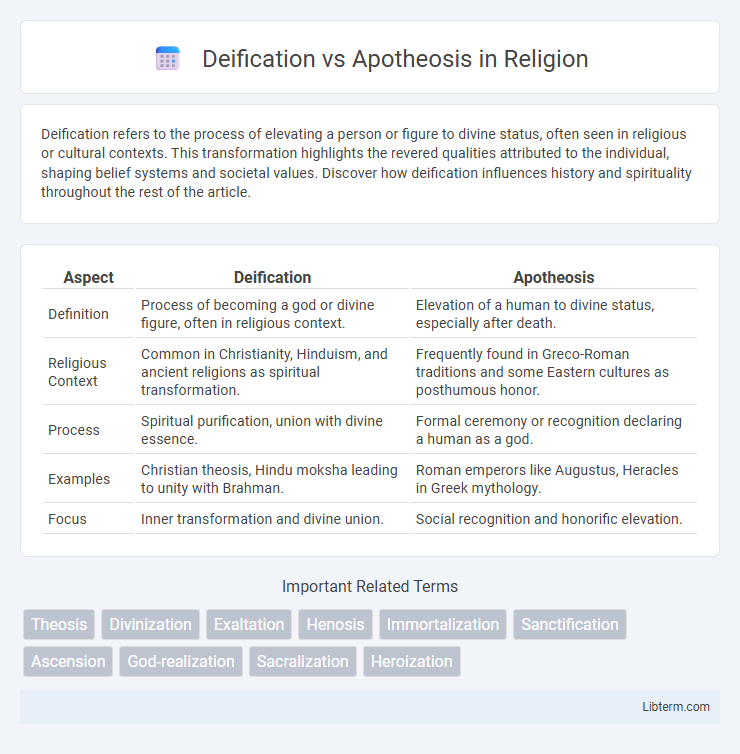Deification refers to the process of elevating a person or figure to divine status, often seen in religious or cultural contexts. This transformation highlights the revered qualities attributed to the individual, shaping belief systems and societal values. Discover how deification influences history and spirituality throughout the rest of the article.
Table of Comparison
| Aspect | Deification | Apotheosis |
|---|---|---|
| Definition | Process of becoming a god or divine figure, often in religious context. | Elevation of a human to divine status, especially after death. |
| Religious Context | Common in Christianity, Hinduism, and ancient religions as spiritual transformation. | Frequently found in Greco-Roman traditions and some Eastern cultures as posthumous honor. |
| Process | Spiritual purification, union with divine essence. | Formal ceremony or recognition declaring a human as a god. |
| Examples | Christian theosis, Hindu moksha leading to unity with Brahman. | Roman emperors like Augustus, Heracles in Greek mythology. |
| Focus | Inner transformation and divine union. | Social recognition and honorific elevation. |
Introduction to Deification and Apotheosis
Deification and apotheosis both refer to the process of elevating an individual to divine status, though they originate from distinct cultural and religious contexts. Deification typically involves transforming a mortal into a God within polytheistic traditions, emphasizing spiritual transcendence and the attainment of immortality. Apotheosis, rooted in ancient Roman and Greek practices, specifically highlights the formal recognition or glorification of a person as a god, often after death or as a state granted to emperors and heroes.
Historical Origins of Deification
Deification traces its origins to ancient Mesopotamian and Egyptian civilizations, where kings and pharaohs were revered as divine or semi-divine beings to legitimize their authority. In Greco-Roman culture, deification (theosis) evolved as rulers and notable figures were posthumously honored by elevation to divine status within state cults. This practice reflects a broader historical pattern of intertwining political power with spiritual divinity to reinforce social hierarchies and governance.
The Concept of Apotheosis in Ancient Cultures
Apotheosis in ancient cultures signified the elevation of a mortal to divine status, often commemorated through rituals, monuments, or literary works that depicted the individual as a god or semi-divine figure. In civilizations such as Ancient Egypt, Rome, and Greece, rulers and heroes were frequently deified to legitimize authority or inspire devotion, blending religious belief with political power. This process reinforced social hierarchies and cultural values by intertwining human achievements with divine sanction.
Key Differences Between Deification and Apotheosis
Deification refers to the process of becoming a god through divine grace or inherent divinity, often associated with religious or spiritual contexts, whereas apotheosis specifically denotes the elevation of a mortal to divine status, commonly seen in historical or mythological narratives. Deification emphasizes ongoing union with the divine essence, while apotheosis highlights a singular transformation event or formal glorification. The key difference lies in deification's spiritual assimilation versus apotheosis' ceremonial or symbolic exaltation.
Religious Significance of Deification
Deification, in religious contexts, signifies the transformation of a human into a divine being, reflecting a deep spiritual union with God or gods, prominent in Christian theology, especially Eastern Orthodoxy's concept of Theosis. This process emphasizes moral and spiritual purification, aiming for participation in the divine nature rather than mere elevation or honor. Deification contrasts with apotheosis, which often implies a posthumous glorification or symbolic acknowledgement of divinity in various mythologies.
Apotheosis in Mythology and Literature
Apotheosis in mythology and literature refers to the elevation of a mortal to divine status, exemplified by figures such as Hercules and Romulus, who are transformed into gods after heroic deeds or death. This concept highlights themes of immortality, transcendence, and the human aspiration to achieve god-like qualities through extraordinary actions. Literary works often utilize apotheosis to symbolize ultimate glorification or moral perfection, reinforcing cultural values and heroic ideals.
Philosophical Interpretations of Deification
Philosophical interpretations of deification explore the transformation of a human into a divine being through spiritual or moral elevation, emphasizing inner perfection and unity with the divine essence. Unlike apotheosis, which often depicts the literal elevation of a person to godhood, deification stresses ontological participation in the divine nature, as seen in Platonic and Eastern Orthodox theological frameworks. This concept underpins ethical self-realization and metaphysical transcendence, highlighting the soul's potential to embody divine attributes through philosophical contemplation and virtuous living.
Notable Figures Who Achieved Apotheosis
Emperors such as Augustus and Constantine the Great were among the notable figures who achieved apotheosis, being officially elevated to divine status in Roman religion after their deaths. In Chinese culture, historical figures like Emperor Qin Shi Huang were sometimes deified, though the concept of apotheosis more specifically refers to a formal, state-recognized elevation to godhood. Unlike general deification, apotheosis often involved elaborate rituals and political endorsement that immortalized leaders as gods within their respective pantheons.
Modern Perspectives on Deification and Apotheosis
Modern perspectives on deification emphasize spiritual transformation and union with the divine, often within contemporary theological and mystical frameworks. Apotheosis is viewed as the elevation of a historical or mythological figure to divine status, frequently reflecting cultural ideals or ideological narratives. Both concepts highlight the human desire for transcendence but diverge in their religious symbolism and socio-cultural applications in the modern era.
Conclusion: Comparing Deification and Apotheosis
Deification refers to the process of becoming a god in a literal or metaphysical sense, often rooted in religious or spiritual traditions, while apotheosis typically denotes the elevation of a historical or mythological figure to divine status symbolically or culturally. The key distinction lies in deification's emphasis on actual divine transformation versus apotheosis as a glorification or idealization in art and literature. Understanding these differences highlights how various cultures perceive the human-divine relationship and the symbolic meaning of elevating individuals to god-like stature.
Deification Infographic

 libterm.com
libterm.com